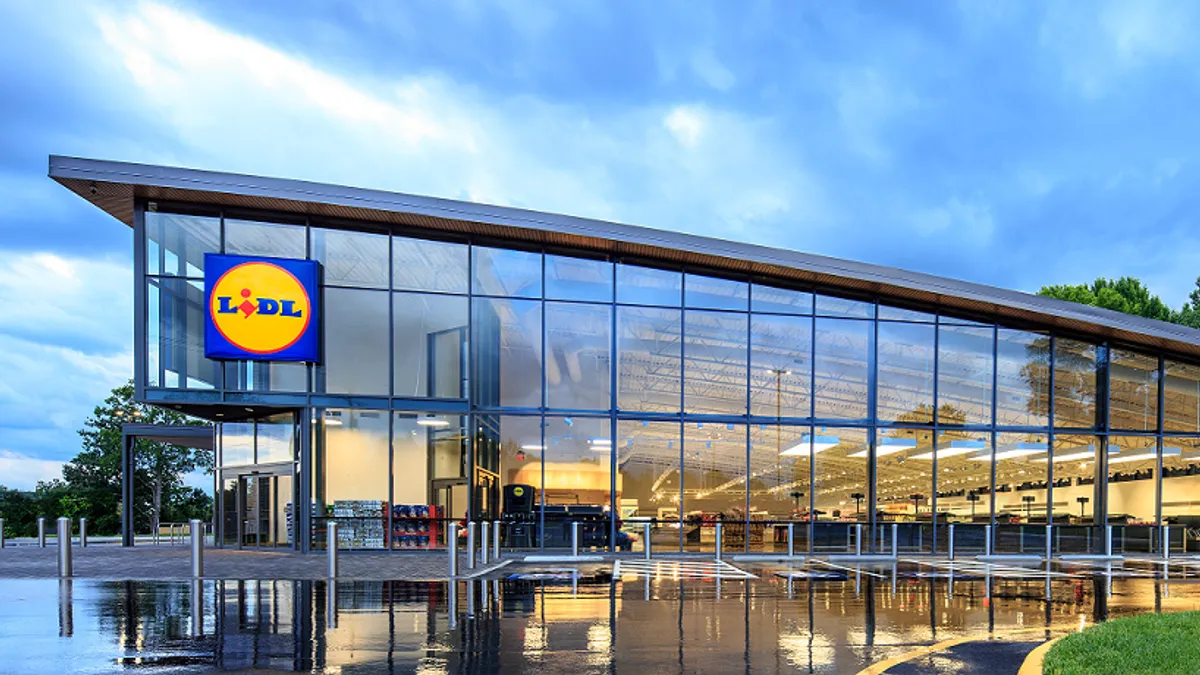Dive Brief:
- Lidl U.S. announced this morning that Johannes Fieber has been appointed as company president and CEO, according to a company release. Fieber will be replacing Brendan Proctor, who has spearheaded the German retailer's U.S. expansion since June 2015, and will assume his new role in the coming months.
- Fieber previously served as CEO of Lidl Sweden for two years, and has been with Lidl for about a decade.
- “I am honored to be able to lead our expansion in the U.S., and look forward to building on the progress that is underway,” Fieber said in a company release. "I look forward to continuing our expansion into additional markets this year, and introducing more customers to Lidl’s high quality products and low prices.”
Dive Insight:
The grocer that has promised to "Rethink Grocery" is clearly rethinking its U.S. strategy, which isn't surprising given its struggle to maintain steady store traffic and communicate its value proposition to American shoppers. But Proctor's exit is just the most recent bout of executive shuffling at the retailer, and could hint at internal instability, as well as parent company Schwarz Group's growing impatience over the grocer's bungled American entry.
As with his exit, Proctor's assumption of his role as head of U.S. operations was also unexpected. Formerly the CEO of Lidl Ireland, he was tapped to replace Kenneth McGrath and Kevin Proctor as the company geared up for its American expansion. At the time, questions swirled about the leadership change, with onlookers wondering if slow progress was the root of the switch. It seems likely that similar problems spurred this latest c-suite shuffle.
Lidl's entry into the U.S. market has been riddled with missteps. Analysts have noted the stores are too big and expensive to operate, locations have been sub-optimal, and the retailer overemphasized nonfood offerings such as gardening equipment, party supplies and yoga pants, which confused American shoppers.
The retailer constructed larger box stores for its U.S. entry to appeal to American tastes — at 36,00 square feet, its American formats are about 35% bigger than its European stores. But as Lidl has continued to flounder and hit the breaks on the construction of several stores across the East Coast, the company is shifting back toward the tried-and-true strategies that have delivered results in Europe. In December of last year, for example, Lidl began looking for stores between 15,000 and 25,000 square feet. It also announced it would begin leasing stores in addition to buying.
It will be interesting to see how Fieber navigates the retailer's U.S. operations through this transition, especially since the stakes are so high. The grocer is slipping further and further behind its initial expansion timeline, and its key differentiators aren't yet resonating with American shoppers. Still, the company is experimenting with new tactics to drive its price-meets-quality message home, including a series of humorous commercials poking fun at how traditional American grocery retailers waste consumer money on unnecessary operations.
Lidl is also running promotions centered heavily on national brands like Coca-Cola and Kettle Chips, an unusual move for a company that prides itself on a portfolio that's roughly 90% private label products. Slashing prices on popular, recognizable brands could help lure American consumers on the fence about the grocer into stores, which has been one of Lidl's main struggles. But research from Oliver Wyman shows that 56% of consumers who shopped at Lidl said they would do so more often, compared to 39% who said so before entering the store — a consumer behavior that could significantly brighten the grocer's future in the U.S.
Fieber will likely continue these initiatives, which have proven successful in their early stages. But if the retailer's performance begins to wilt again, he'll need to prove quick on his feet with new strategies — or risk being replaced.









